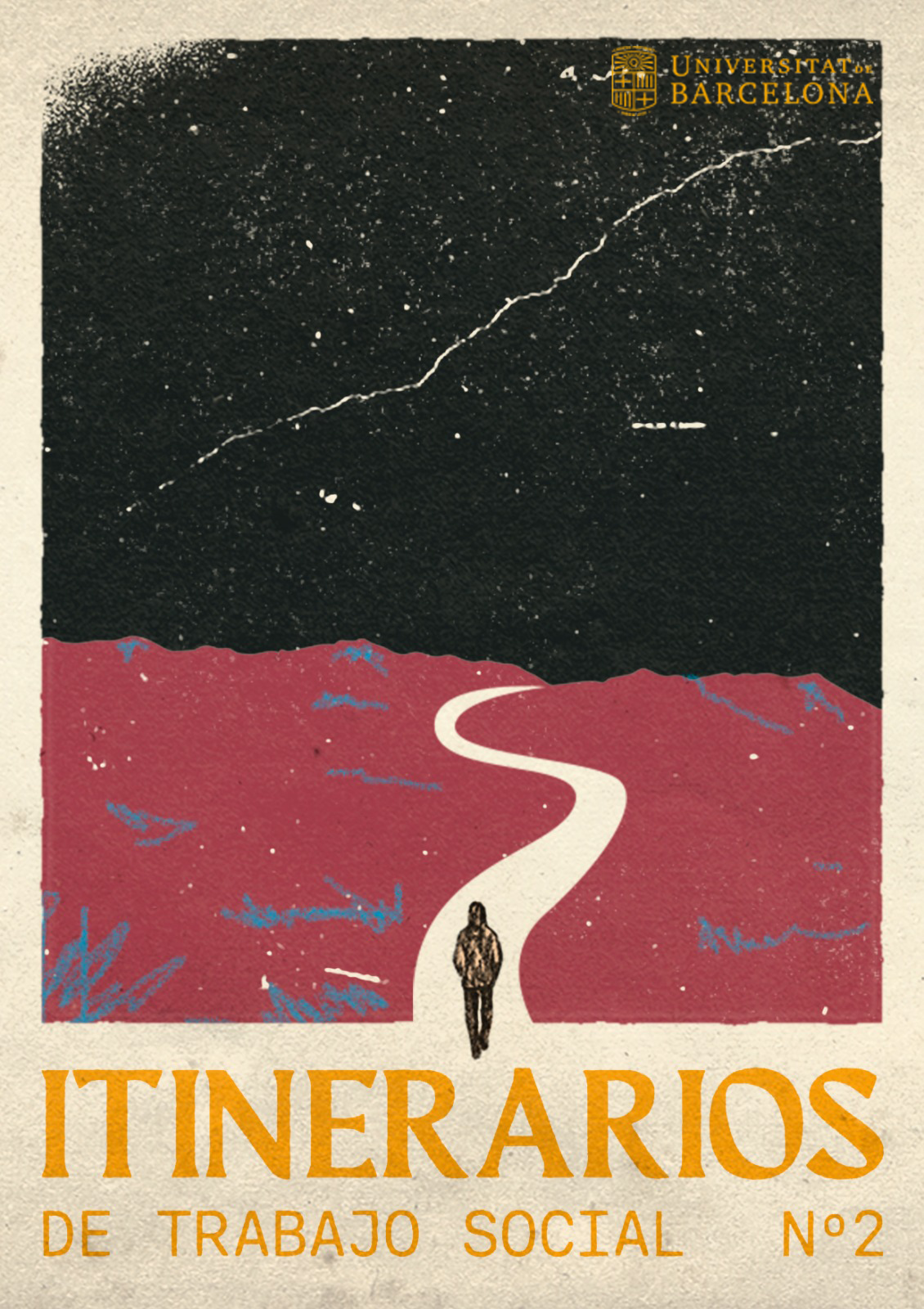“At the begining I thought that the problem was me”.
Autoethnographic narrations from racialized professionals who work on social intervention.
DOI:
https://doi.org/10.1344/its.i2.36870Keywords:
racialized professionals, social intervention, power relations, stigmaAbstract
The fact that racialized people do access the skill labor market, continues to be anecdotical. Very few people have been able to overcome all the bureaucracy trammels and social stigma to obtain a job position. Not to mention to find one within institutions that are public or from the third sector and that acknowledge their vocational training and academic preparation. In this article we analyze some of the aspects that characterize de relationship established between the native professionals and racialized people which occurs in the workspace. The methodological approach implemented is focused on autoethnography and an autobiographical account since we start from the experiences of the authors themselves, in order to seek for visibility and put in debate what has been live but silenced until now. The results show how the social interventions made by racialized professionals are constantly reduced to their origin and their supposed culture, in order to resolve only situations that are not in the range of the native professionals. The background of racialized people is underestimated and instrumentalized during social intervention. Consequently, the workspace becomes an insecure environment, full of suspicious looks, troubling the presence and ignoring the racialized professionals skills and capabilities.
References
Agrela, B. (2006). Análisis Antropológico de las políticas sociales dirigidas a la población inmigrante [Tesis doctoral, Universidad de Granada]. Repositorio Institucional de la Universidad de Granada. http://hdl.handle.net/10481/1091
Blanco, M. (2012). Autoetnografía: una forma narrativa de generación de conocimientos. Andamios, 9(19), 49-74. http://dx.doi.org/10.29092/uacm.v9i19.390
Boragnio, A., Dettano, A., y Sordini, M. V. (2018). Poniendo sobre la mesa el proceso: el aprendizaje de metodología como conflicto y la auto-etnografía como herramienta. Intersticios: Revista Sociológica de Pensamiento Crítico, 12 (1), 65-79. https://www.intersticios.es/article/view/17870
Cobo, M. O., y Bianco, R. (2020). ¿Está en crisis la Mediación Intercultural Escolar? Estudio longitudinal desde una visión sociológica. RASE. Revista de Sociología de la Educación, 13(1), 20-35. https://doi.org/10.7203/RASE.13.1.15765
Comas D’Argemir, D. (1995). Trabajo, género, cultura. La construcción de desigualdades entre hombres y mujeres. Icaria.
Contreras Hernández, P. C., Santa Cruz Castillo, U., y Gómez Salas, A. (2020). De derechos, exclusión y ciudadanía. Una aproximación al contexto migra torio español. Encuentros. Revista de Ciencias Humanas, Teoría Social y Pensamiento Crítico, (12), 09-25. https://doi.org/10.5281/zenodo.3947040
Correa, J. U., y Castellanos, R. L. (2021). Trayectorias laborales y educativas de jóvenes racializados en Catalunya desde una perspectiva interseccional. Propuestas Críticas en Trabajo Social - Critical Proposals in Social Work, 1(2), 97-119. https://doi.org/10.5354/2735-6620.2021.60948
De Paula Faleiros, V. de P. (2011). Desafíos del Trabajo Social frente a las desigualdades. Emancipação, 11(1), 117-128. https://doi.org/10.5212/Emancipacao.v.11i1.0009
Doubront, L., Doubront, A., y Gómez Alfonzo, A. (2021). Abordaje epistemológico en la investigación social para la producción de teorías científicas. Correspondencias & Análisis, (13), 127-152. https://doi.org/10.24265/cian.2021.n13.05
El Mouali, F. (2021). Inmigración del Sur global: Relatos silenciados de mujeres migrantes en España. Geopolítica (s). Revista de estudios sobre espacio y poder, 12(1), 11-21. https://doi.org/10.5209/geop.73530
Evans, L., y Moore, W. L. (2015). Impossible bur dens: White institutions, emotional labor, and micro-resistance. Social Problems, 62(3), 439-454. https://doi.org/10.1093/socpro/spv009
Haraway, D.J. (1995). Ciencia, cyborgs y mujeres: la rein vención de la naturaleza. Universitat de València.
Kovacheva, S., Popivanov, B., Peeva, R., Coletto, D., Dimitriadis, I., Fullin, G., Fischer-Souan, M., y Marcovici, O. (2018). Growth, Equal Opportunities, Migration and Markets (GEMM) Report on institutional and contextual factors. https://gemm2020.eu/?resources=report-on-institutional-and-contextual-factors
Martínez, J. G., y Garcés, A. L. (2021). La racialización étnica en el mercado laboral español desde un enfoque de género. La doble desigualdad sistémica: Mujer e inmigrante. Interacción y perspectiva: Revista de Trabajo Social, 11(1), 3-19. https://www.produccioncientificaluz.org/index.php/interaccion/article/view/36225
Martínez Rossiter, M. C., y Torrecilla, A. (2015). El objeto de intervención del trabajo social y su construcción a lo largo de la historia. Documentos de trabajo social: Revista de trabajo y acción social, (56), 229-240.
Zhang-Yu, C., y Lalueza, J. L. (2018). Narrativas identitarias en entornos de diversidad cultural: una autoetnografía gráfica. Ámbitos. Revista Internacional de Comunicación, 39,89-103. http://dx.doi.org/10.12795/Ambitos.2017.i39.09
Downloads
Published
How to Cite
Issue
Section
License
Copyright (c) 2022 Cheima El Jebary Amisaou, Fatiha El Mouali Samadi

This work is licensed under a Creative Commons Attribution-NonCommercial 4.0 International License.
The author who publishes in this journal agrees to the following terms: (1) The author retains the rights of authorship and grants the journal the right of first publication of the work, (2) The texts will be disseminated under the Creative Commons recognition license detailed in this section.
The authors certify that the submissions have not been presented and will not be presented in other scientific publications, transferring non-exclusively the exploitation rights to the journal for the dissemination of the article in any of the possible formats (print, electronic, media dissemination, social networks or any other). In the case of having been previously submitted, but not published, it is necessary to make this clarification.
The journal is published under Creative Commons Attribution-NONCOMMERCIAL 4.0 International (CC BY-NC 4.0) license. Immediate and free access is permitted and any user is allowed to read, download, copy, distribute, print, search or link to the full texts of the articles, crawl them for indexing, pass them as data to software or use them for any other lawful purpose as long as no commercial use is made. Manuscripts in the journal may be reproduced in whole or in part provided that the source is properly cited. Authors may deposit the final version of their accepted articles in institutional repositories or repositories of their choice.
The journal will exercise this right beyond its own media (web or print) provided that it helps the dissemination of the contents (inclusion in databases, repositories or similar of external institutions).
Dissemination of content
The journal reserves the right to disseminate in print or electronic channels the content of the articles, including social networks and media, among others.












